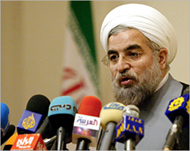Nuclear row: Iran warns of oil crisis
Iran’s top nuclear official has warned the US and Europe of the danger of an oil crisis if Tehran is sent before the UN Security Council over its nuclear programme.

Tehran has argued that it wants to enrich uranium to generate atomic energy purely for civilian use, and argues such work is authorised by the nuclear Non-Proliferation Treaty (NPT).
Hasan Rowhani, Iran’s chief nuclear negotiator whose country is the second largest oil producer in Opec, said: “The first to suffer will be Europe and the United States themselves, this would cause problems for the regional energy market, for the European economy and even more so for the United States.”
Iran reiterated it intended to use enriched uranium only in power stations, but Washington insists Tehran is making fuel for atomic warheads.
“If the Americans succeed in referring Iran‘s case to the Security Council, Iran will immediately suspend all its voluntary confidence-building measures,” Rowhani said.
“If US pressure doesn’t prevent it, I think we will manage to reach an agreement with the Europeans because they don’t want to deprive the Iranian people of their right and will try to act fairly,” Rowhani said.
Economic incentives
EU states are encouraging Iran to drop its fuel programme in return for economic incentives.
Rowhani, who visited the German and French capitals for talks on the issue at the end of February, has however refused to put an end to uranium enrichment.
 |
|
Rowhani: Europe doesn’t want to |
“We cannot have and we will not have negotiations with the Europeans if what they want is an end” to uranium enrichment,” he said.
“We will not continue the talks for one single minute, we have made it very clear to Paris and Berlin. Parliamentarians may even come up with a harder decision.”
Many conservative parliamentarians have called for Iran to pull out of the nuclear Non-Proliferation Treaty (NPT).
Snap inspections
In the shorter term they have threatened that Iran will not ratify the Additional Protocol to the NPT, which permits snap UN inspections of nuclear sites.
“The security and stability of the region would become a problem,” Rohani who is secretary-general of Iran‘s Supreme National Security Council, said.
“This would be a particular problem for the United States because it has a lot of troops and equipment in the region and is in fact our imposed neighbour.”
“This would be a particular problem for the United States because it has a lot of troops and equipment in the region and is in fact our imposed neighbour” |
Iran has often said that it feels besieged by the United States, which has troops in Iraq and Afghanistan and has conducted military exercises in the Caspian Sea.
Objective guarantee
But Rowhani still held out hope that talks with Europeans could pay dividends, saying Iran had given the Europeans “an objective guarantee” that it was not seeking arms.
“The ball is in the Europeans’ court right now,” he said, adding Iran would make the terms of its guarantee public if the Europeans rejected it.
He said any European position asking for an end to the fuel cycle – enriching uranium to make nuclear fuel – as an objective guarantee, was unacceptable.
“My feeling is that Berlin and Paris have accepted the middle-of-the-road approach,” he continued.
Iran-EU talks continue in Geneva next week.